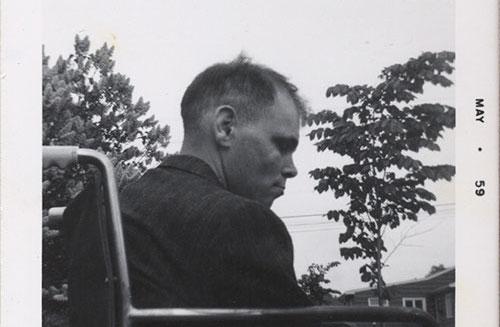
As I have written before, I began Larry Eigner's biography out of passion, hope, and my good looks. For once I was beginning to feel part of something, which is a particularly difficult thing for a poet. I began to have a place. What I did not have (and still don't) is funding or support from a university. In the early stages, I did a Kickstarter with the assistance of my trusty intern, Eric Rydin. We raised $5000. I was also given a small grant from the Dodd Research Center at the University of Connecticut.
Despite a 50-year career as a poet, essayist, fiction, and letter writer, Eigner was never given a single award in his lifetime, nor was he involved in academia in any way. In the 1970s, he wrote a letter to his sister-in-law Janet telling her that Robert Grenier encouraged him to get a teaching job. But the chances of someone with such a severe disability, or any disability for that matter, getting an academic job in the 1970s would have been highly unlikely.
It seems as though awards (or at least the competition for them) are a bigger deal now than back then. I decided to take a look at the experiences of some of Eigner's close contemporaries. In 1988, the American Book Award was given for The Collected Poems of Charles Olson. Olson would have been really excited, except for the fact that he had been dead for 18 years. However, the award was well deserved, as it went to Olson's editor, George Butterick, who died at age 45 shortly before (or after) it was given. In 1939, Olson DID get the Guggenheim, but that was for scholarship on Melville, not poetry. Denise Levertov was a little luckier: she received a Frost Medal, a Lannan Literary Award, a Pulitzer Prize, and a 1963 Guggenheim, which she famously confessed that she used to buy a washer and drier. As a young poet, this confession tickled me endlessly. Levertov was tired of going to the laundry mat. One of her best pals, Robert Duncan, received only a Shelley Memorial Prize four years before his death.
Eigner himself had a very complicated relationship with money. In some ways, he was extremely privileged and viewed money as superfluous. His grandfather on the Eigner side was a real go-getter. He immigrated from Europe in 1888, and in short order built a number of businesses, married, and had eleven children. Instead of admiring his grandfather, Eigner was critical of what he viewed as a life based on "striving." In a poem dated 1950-52, he wrote:
"Keep at it,” they say when they see L.
reading, then disappear down the front steps
and plenty die, playing the black market
a heart attack in middle age
There is so much to be explored in this tiny poem, as there is in all of Eigner's work. For the present, I would like readers to consider Eigner's perception of finances. The unnamed person who is marching off to work gives a condescending encouragement to the figure, "L," left behind on the porch "reading." Instead of viewing work as something to be admired and envied, “L” views it dramatically as a path to death in "middle age."
In 1971, the poet David Gitin convinced Eigner to apply for a Guggenheim Grant, something Eigner had no interest in. It was the only time in his life he applied for a grant or prize. His feelings about the application, and money in general, are summed up in a letter to Cid Corman: "On top of it all I’ve finally consented to apply for a Grant (last straw my own abrupt idea of 'getting used to money.')" After he found out that the grant been denied. He told Corman, “word came 10 days ago, 370 did out of 2500 applicants.” But he didn’t feel “disappointment abt not winning.”
He may have taken a position of resistance from Corman, who constantly complained that any sort of such mainstream thing was reprehensible. But, more likely, it was a culmination of factors in his life. His mother had a very strong, Protestant work ethic, and resisted accepting any outside help. She was diligent to the point of never hiring assistance for the household or caring for Eigner. Eigner did not have any relationship directly with money until he left his parent's home at age 50. He never had to look for a job. He never had to run a household.
In my previous post, I mentioned obtaining a box of Eigner's possessions. Here, I found a copy of his edition of Charles Olson's book The Maximus Poems. Tucked into its pages was a letter from Social Security with instructions on how to apply for Social Security Insurance; the only practical use of the letter was to serve as a bookmark.
Jennifer Bartlett’s most recent book is Autobiography/Anti-Autobiography (theenk Books, 2014). Bartlett...
Read Full Biography

